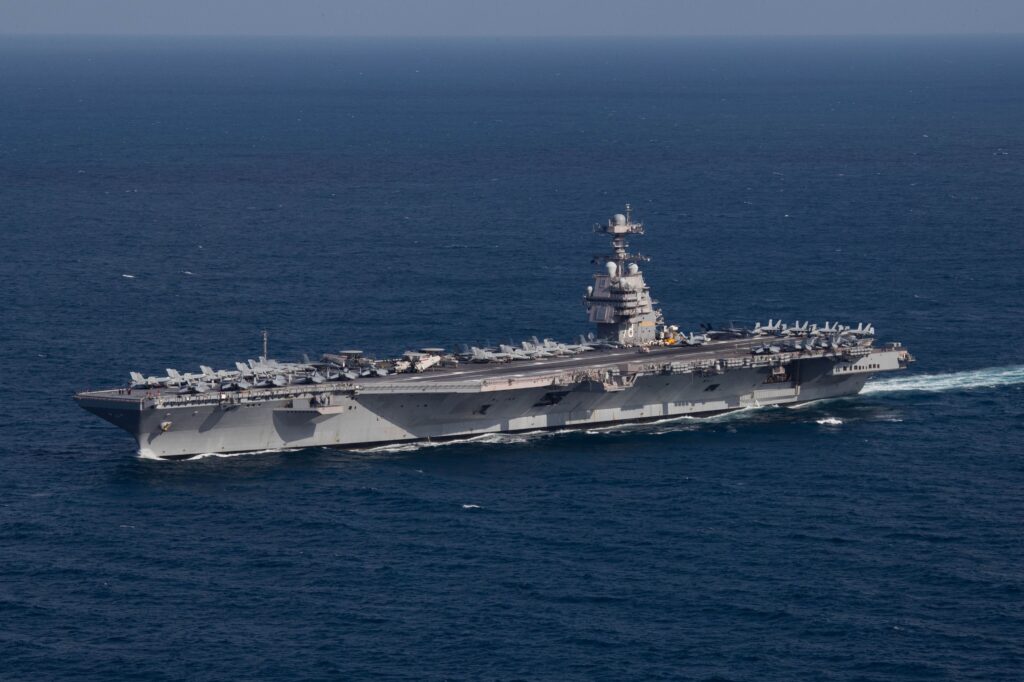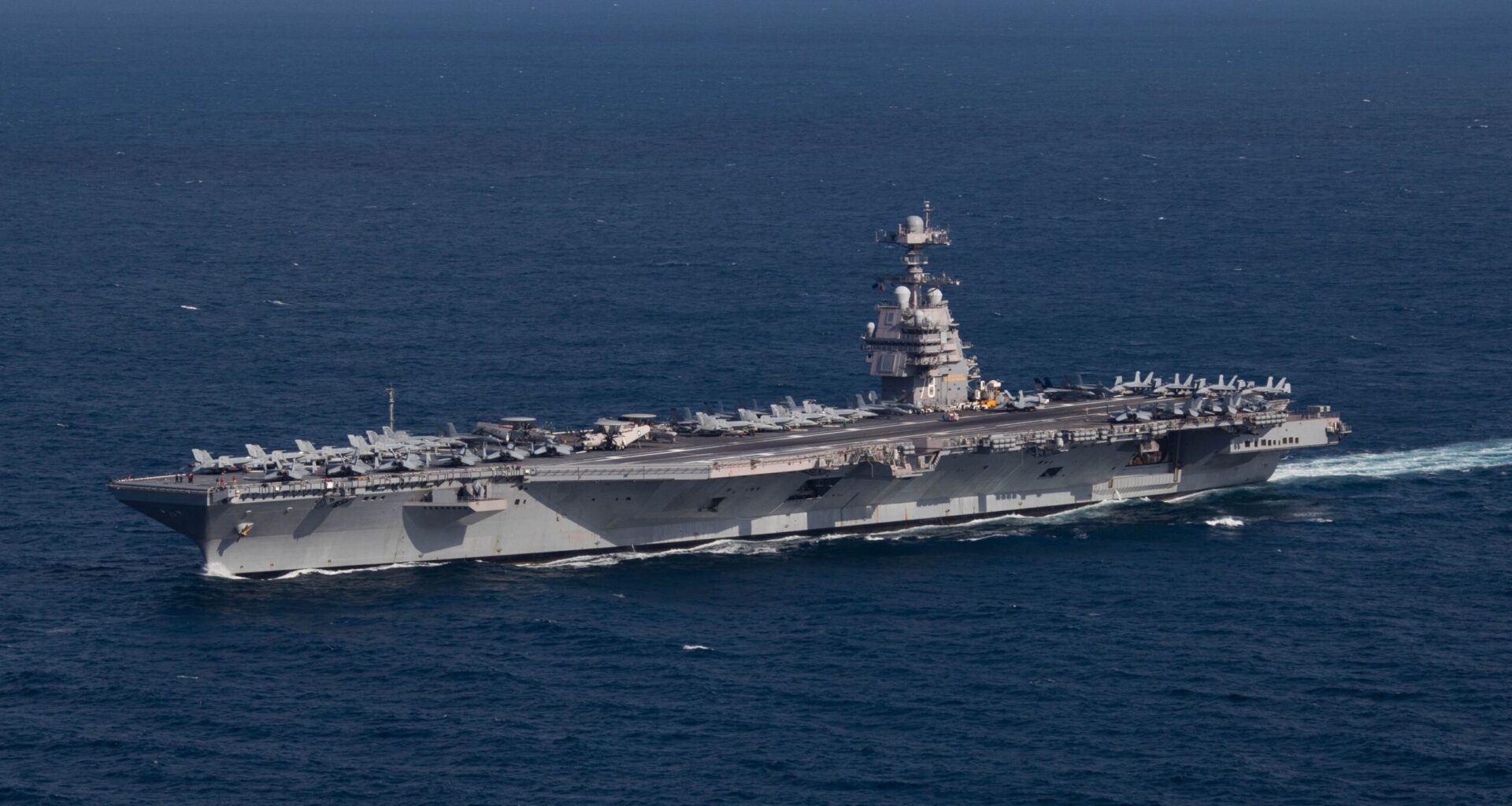
Donald Trump has already killed 64 people in boat strikes in the Caribbean and eastern Pacific. This campaign targets what his administration calls “narcoterrorism” associated with Venezuela and its president, Nicolás Maduro. Most experts agree there is no legal justification for these boat strikes – which would make them extrajudicial killings.
Last week, the Pentagon ordered an aircraft carrier, the USS Gerald Ford, to join the large buildup of U.S. forces off the Venezuelan coast. Trump and his team have talked openly about attacking targets inside Venezuela. On Friday morning, the Miami Herald reported that strikes may be imminent, though Trump denied that later in the day.
As political scientist Heather Sullivan outlined here on Good Authority, there are many reasons to doubt that an attack on Venezuela would do much to achieve the administration’s stated goal to stem the flow of drugs into the United States, or its unstated one to oust Maduro. The research on foreign-imposed regime change is clear: It is unlikely to lead to democracy, and very likely to lead to violence and even civil war. It’s right there in the title of political scientist Alexander Downes’ 2021 book, Catastrophic Success: Why Foreign-Imposed Regime Change Goes Wrong.
So a military intervention in Venezuela, especially one designed to oust Maduro, would be very risky under the best of circumstances.
But these are far from the best of circumstances. Trump’s inexperienced and highly centralized national security team makes a military intervention even more risky.
Experience matters – but whose experience?
During the 2016 presidential campaign, I wrote about why electing an inexperienced president added risk to national security decision-making, and why an experienced team of advisers could not compensate. My research on how the experience of a president and his advisers interact shows that experienced presidents have three advantages in managing a team: Advisers are aware of presidential experience, so they improve proposals before they take them to the Oval office; advisers are less likely to take independent risks with policy; and experienced leaders have the confidence to consult a diverse array of advisers and listen to counterarguments.
To be sure, experience brings its own problems. Experience can lead to entrenched worldviews, which may be helpful for quick decision-making in some settings, but may not necessarily suit the situation at hand. Experience also tends to foster overconfidence, which can be especially dangerous in war.
But inexperience, especially in a leader, brings serious problems. Inexperienced leaders are reliant on advisers but don’t know what to look for or ask about when advisers present options, so they are less likely to see problems or unnecessary risks in policy plans. Inexperienced presidents are also less likely to consult experts for fear of looking weak.
This is not Trump’s first rodeo
In my book, The Insiders’ Game, I found that advisers are a crucial check on presidential decisions about war and peace. During Trump’s first administration, he appointed many experienced officials to top posts, such as Defense Secretary James Mattis and White House Chief of Staff John Kelly. Trump’s advisers reportedly restrained a number of his most extreme impulses on national security – including Trump’s musings in 2017 about invading Venezuela. Perhaps because they were busy acting as guardrails, these advisers engaged in less freelancing and risk-taking than we might have expected.
Of course, Trump now has the experience of doing the job before. But in his second administration, Trump faces almost no guardrails, especially on national security. The Supreme Court, always deferential to the executive on national security matters, granted sweeping presidential immunity in its 2024 decision in Trump v. United States. What limited resistance Congress offered to Trump’s foreign policy in his first administration is completely absent in his second.
And this time, there are no constraints coming from within Trump’s inner circle, which he packed with loyalists.
This Trump team is different
It’s not only the lack of constraints that is different: The roles and the people who fill them are adding extra risk to the planning and conduct of national security operations.
One source of risk is “centralized risk,” which arises from over-centralization of decision-making and reliance on mostly inexperienced advisers. The entrenched views of the president, or those to whom he delegates, come to dominate, cutting leaders off from information and debate from different parts of government. This can happen when presidents want to be their own secretary of state (like President John F. Kennedy did) or pull power into the White House and away from departments (as President Richard Nixon and his dual-hatted national security advisor and secretary of state, Henry Kissinger, tried to do). These types of risk are on full display in 2025 through Trump’s penchant for impulsive, unstaffed, and highly personal diplomacy, whether in televised Oval Office meetings or on social media.
It’s not just Trump, however. Many people, including all 99 of his Senate colleagues, were relieved that Trump appointed Senator Marco Rubio (R-Fla.), who was familiar with foreign policy issues from his time in the Senate, to be secretary of state, the nation’s top diplomat. Rubio quickly became Trump’s loyal agent of destruction, however, taking on the title of acting head of USAID when Trump and Elon Musk ended the foreign aid agency. He then became the acting archivist of the United States after Trump fired the previous National Archives chief – all while cutting the State Department’s personnel and expertise in many areas of the world with ongoing conflicts.
After National Security Advisor Michael Waltz was ousted for his role in “Signalgate” – the group chat that openly discussed strikes on Yemen – Rubio took on that title as well (though Rubio was also part of the unsecured group chat). The national security adviser’s role is to coordinate the advice, information, and planning from the various departments and agencies related to national security. In practice, the National Security Council has become a major power center in its own right. Making Rubio national security adviser further centralized decision-making in the White House.
Since the secretary of state is not an easy job to do part-time, this move further downgraded the importance of diplomacy in Trump’s foreign policy. And it put Rubio, whose experience comes with its own biases and risk of overconfidence, in a role closer to the center of decision-making, while cutting that decision-making off from what is left of the government’s experienced foreign policy experts. On top of that, the president’s deputy chief of staff, Stephen Miller, is also the head of the White House Homeland Security Council, and reportedly deeply involved in planning the boat strikes in the Caribbean.
Loyalists in charge
The second type of risk in Trump 2.0 is “incompetent risk,” when inexperienced leaders rely on inexperienced advisers. While Trump has more experience than he did in 2017, he seems to regularly engage in just a few foreign policy issues, however – like tariffs, or proclaiming his peacemaking successes. That leaves the door open for inexperienced advisers to operate without oversight.
And many of those advisers are inexperienced loyalists by design. For example, Trump relies on his real estate friend Steve Witkoff for highly sensitive negotiations, including repeated visits to see Vladimir Putin in Moscow.
Most relevant to the Venezuela operation, however, is Trump’s choice of Pete Hegseth, a Fox News host, to be secretary of defense, despite Hegseth’s lack of leadership of any large organization. Hegseth began his tenure by firing several top military leaders, as well as lawyers that advise the Pentagon on the legality of its operations. As the civilian leader of the Pentagon, he is the crucial link in the chain of command that runs from the president to the military combatant commanders.
Combine that with the gutting of expertise on national security matters, the absence of staffwork that would typically go into summits, military plans, and even mundane diplomatic meetings, and Trump’s inattention to detail, and today’s White House has a highly volatile decision-making apparatus.
Concepts of a plan for Venezuela?
All of this makes a potential strike against Venezuela extra risky. While Trump has done this job before, he is hardly known for asking detailed questions about plans or thinking about the long-term consequences of his actions. This suggests that the advisers behind the current Venezuela plans have a lot of room to maneuver.
And those advisers will go where their own biases and preferences take them. As the New York Times and others have reported, Rubio has been an important driver of military action in the Caribbean, in part because he views it as an opportunity to oust Maduro. Rubio, the son of Cuban immigrants to the United States, has long spoken out against Maduro, decrying Venezuela’s ties to Cuba and calling Maduro’s regime illegitimate. Unable to convince Trump on the regime change grounds, however, Rubio reportedly undermined a potential deal between Trump and Maduro earlier this year, and helped reframe the issue around stopping the flow of drugs, an issue Trump cares about. Miller, previously a skeptic of regime change operations, reportedly now sees military action against Venezuela as part of drug and immigration policy, long his preoccupation.
Most importantly, with reports that strikes inside Venezuela are imminent, there is high risk of poor information and incompetence in the operation itself – and little focus on what might happen in the aftermath. To be sure, the U.S. military is a competent and professional organization, but the president and his appointed civilian advisers make the final decisions about military operations. Admiral Alvin Holsey, head of US Southern Command (responsible for operations in Central and South America), announced he would step down less than a year into his appointment, reportedly after expressing concern about the boat strikes. Inexperienced loyalists and Rubio’s centralized role mean the president has even less access to reliable information and diverse sources of advice, even if he were inclined to make use of it.
Whatever happens next, Trump’s team is only magnifying the dangers in using military force inside Venezuela.
Related

